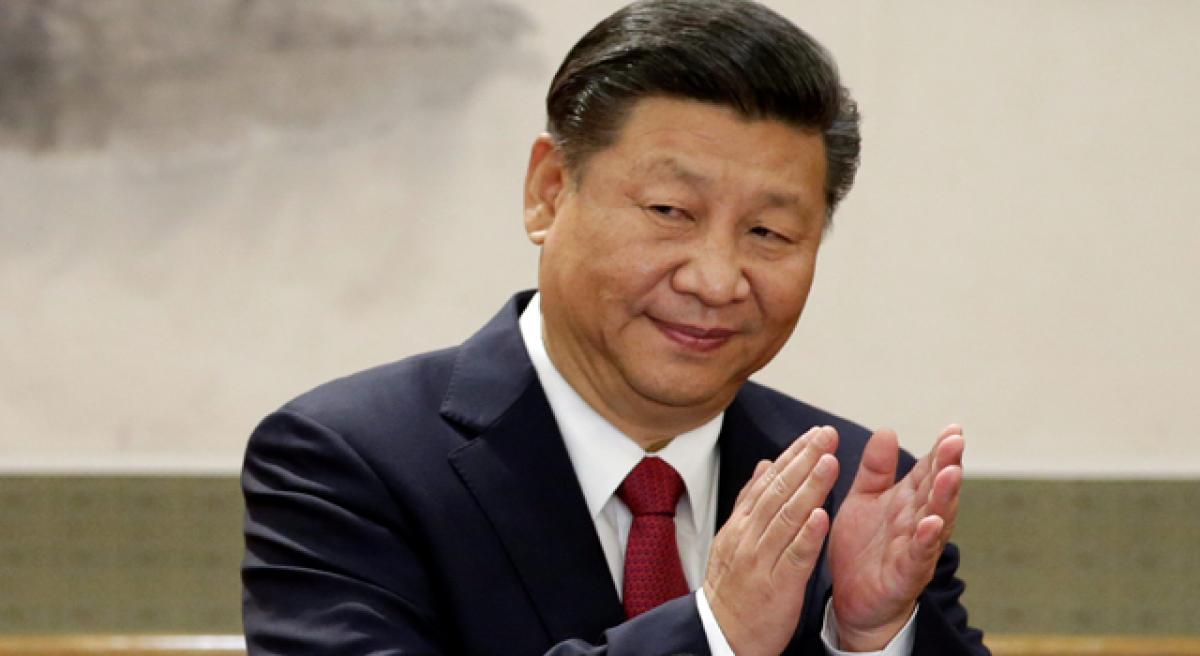Live
- New TTD Trust Board to meet in Tirumala today
- Drone survey held for laying smart roads
- MyVoice: Views of our readers 18th November 2024
- It’s time to defeat betrayers: Revanth in Maharashtra
- Committees formed, assigned tasks
- Let law and order be in sole domain of union!
- Group-III exams off to a smooth start
- KTR invited as guest of honour at TiEcon Kerala 2024
- KTR gets his freedom in a deal done in Delhi: Bandi Sanjay
- Hyderabad Ready to Host FIFA Friendly Football Match Between India and Malaysia
Just In

China\'s rubber-stamp parliament on Sunday allowed President Xi Jinping to rule indefinitely, perhaps for life, as it ratified a contentious constitutional amendment to abolish the two-term presidential limit, making him the most powerful leader since Chairman Mao Zedong.
Beijing: China's rubber-stamp parliament on Sunday allowed President Xi Jinping to rule indefinitely, perhaps for life, as it ratified a contentious constitutional amendment to abolish the two-term presidential limit, making him the most powerful leader since Chairman Mao Zedong.
The amendment to give 64-year-old Xi an indefinite term effectively ended the collective leadership system followed by the ruling Communist Party of China (CPC) to avert a dictatorship from emerging in an otherwise one-party state akin to the era of Mao which witnessed the most brutal events like Cultural Revolution resulting in the killings of millions of people.
Set for his second five-year term as president this month, Xi, the most powerful leader in recent decades heading the CPC and the military, will now be the first Chinese leader after founder chairman Mao to remain in power lifelong.
The National People's Congress (NPC) has kept its reputation as the rubber stamp parliament for its routine approval of CPC proposals by voting exactly to the official script. The amendment removing the term limits for the president and the vice president was approved by the NPC with 2,958 in favour, two against and three abstentions, official media reported.
The two votes of dissent apparently had official sanction to show a semblance of diversity. For today's vote, the NPC chose to follow paper ballot system instead of hand raising and electronic voting. Xi stood up first at the Great Hall of the People in Beijing to cast his paper ballot in a red box.
The first Constitution of China was enacted in 1954.
The current Constitution has been in place since 1982 and has undergone four amendments in 1988, 1993, 1999 and 2004. The removal of the term limit was regarded as the biggest political change in the one-party system which has remained in force in China since 1949. Ahead of the vote by deputies in the NPC, the seven member Standing Committee - the topmost body of the CPC - unanimously approved the amendment to abolish the presidential term limits.
Observers say the constitutional amendment in effective paves the way for China's transition from being a one-party state to a one-leader state with Xi, described by some as an "Emperor", to remain in power in the foreseeable future. Xi, christened as "lingxiu" - a leader with highest prestige, is aggressively pushing China's military modernisation to make the world's largest army a mightier force capable of winning modern wars. The proposal of a limitless tenure for Xi has sparked worldwide concerns specially in China's neighbourhood.
For India, observers say, Xi's continuation will have particular significance, especially in the backdrop of last year's 73-day-long Dokalam standoff where Chinese troops tried to build a road in the area claimed by Bhutan to reach close to India's narrow corridor connecting its north-eastern states.
Under Xi, China has poured billions of dollars into India's neighbourhood in projects like China-Pakistan Economic Corridor traversing through PoK, projects in Nepal, Sri Lanka and Maldives, raising India's strategic stakes. The CPC has justified scrapping of term limits for Xi saying that it is aimed at strengthening coordination between the party, the military and the country and dismissed concerns of the return of Mao-era dictatorship as "groundless".
Significantly, today's amendment also removed term limits for the vice president. The inclusion of the vice president was notably aimed at reinforcing Xi's support base as his trusted lieutenant, 69-year-old Wang Qishan, is tipped to take over the post despite a widely-followed convention by Chinese leaders to retire after 68 years of age. Wang headed the dreaded anti-graft campaign carried out by Xi since he began his first term in 2013. The NPC in the next few days is also set to ratify new names for all top government posts. The entire Chinese government is set to change, including the entire cabinet.
Xi began his second five-year term as General Secretary of the CPC and Chairman of the Central Military Commission last year after the once-in-five-years congress of the party endorsed him for a second term. Two five-year tenures were permitted for top leaders of the party. His predecessors - Jiang Zemin who was in power from 1993 to 2003 and Hu Jintao from 2003 to 2013 - stepped down as the General Secretary of the party as well as president after a widely followed rule as well as a convention of two terms to promote collective leadership system in the one-party state.

© 2024 Hyderabad Media House Limited/The Hans India. All rights reserved. Powered by hocalwire.com







